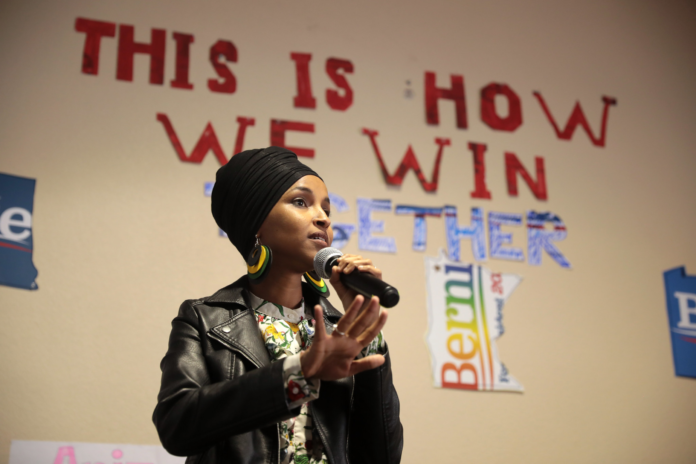
Rep. Ilhan Omar and two other progressive House members have written an op-ed pushing the radical “Build Back Better” agenda.
Published on CNN, the op-ed attempts to make the case for the Infrastructure Investment and Jobs Act and the Build Back Better Act. The latter is named after a slogan that gained currency in the wake of the COVID-19 pandemic and had been popularized by Joe Biden’s presidential campaign in 2020.
The authors of the op-ed include Reps. Pramila Jayapal of Washington and Katie Porter of California, along with Minnesota representative and “Squad” member Omar. They acknowledge the proposed legislation would be “transformative” and argue that such a transformation is necessary.
“Parents can’t get back to work because they can’t find affordable child care. Young people are infuriated that their country’s leaders are not taking aggressive enough steps to leave them a livable planet,” the congresswomen claim. “Families are struggling to stay healthy in dangerous, crumbling public housing. Immigrant communities are tired of living under the threat of deportation.”
The left-wing congresswomen portray themselves as acting in accord with the will of the American people. They claim the “Build Back Better” agenda is endorsed by a sweeping majority of Americans.
“When President Joe Biden announced in the spring his plans for ‘once-in-a-generation investments in our nation’s future,’ he said that ‘it is not enough to restore where we were prior to the pandemic. We need to build a stronger economy that does not leave anyone behind — we need to build back better.'”
“That is our shared vision — the vision the American people voted for — and it is what we as Congressional leaders must deliver with urgency,” Omar and the others write.
The Build Back Better Act contains a number of major provisions that would radically transform the American landscape and the nature of government spending. CBS News summarizes these provisions as follows:
- $108 billion for two free years of community college for all students.
- $80 billion in additional funding for Pell Grants, a program for college students who “display exceptional financial need.”
- $450 billion for child care assistance and two years of universal pre-K.
- Numerous climate change provisions, including $150 billion to “pay utility companies that increase their renewable energy supplies by 4% per year,” along with the threat of “financial penalties” for those who don’t meet that mark.
- $225 billion to fund 12 weeks of paid family and medical leave over the next decade.
- Expansion of Medicare to include dental, hearing, and vision coverage.
- Extended child tax credit through 2025, which comes almost seven months after already extending it through 2021.
The Build Back Better Act could very well fail, despite the best efforts of Omar and her colleagues to get it passed. For one, House Democrats themselves still haven’t come to a full agreement on its exact provisions. They missed their “self-imposed deadline” to vote on the bill last week, according to NPR.
And even if it does pass the House, the bill in its current form would likely die in the Senate, as Democratic Sens. Joe Manchin of West Virginia and Kyrsten Sinema of Arizona oppose key provisions in the bill.
Reps. Omar, Jayapal, and Porter claim in their op-ed that opposition to the Build Back Better Act means de facto opposition to “help for families.”
“We must deliver for American families. Our Progressive Caucus members will put our votes on the line to send the entirety of the Build Back Better agenda to President Biden’s desk,” they conclude.
















